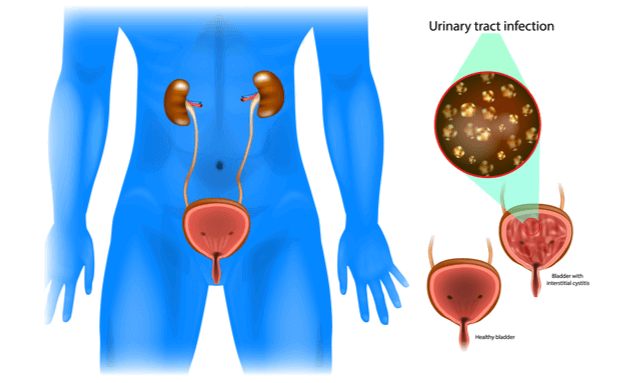
UTIs In Men and What You Need To Be Aware Of
Men are surprised to discover this because UTIs are usually associated with women. But yes, men get UTI's and they get them more severe than women, especially as they get older. Unlike women, when a UTI develops in men, it is usually complicated and needs immediate medical intervention, which often can be surgery. This is so because it is more likely to spread to the kidneys and the upper urinary tract.
What Are The Causes Of UTI?

In both men and women, most UTIs are caused due to a buildup of bacteria along the urinary tract. The most common bacteria to strike is Escherichia coli or E.coli, found in the Gastrointestinal tract (GI). This type of UTI is called Cystitis and it is the one that affects most men. Yet, they are more common in women than in men because women have shorter urethra, allowing the bacteria to travel a shorter distance in order to reach the bladder. In women, you also see occurence of Urethritis, when GI bacteria spreads from anus to urethra.
When the bacteria enter the urinary tract through the urethra, it starts to multiply in the bladder. This causes the infection. In men, UTIs can develop in the urethra, the bladder, the prostate or the kidneys. Particularly in older men, there is a likelihood of developing non-cancerous enlargement of the prostate gland, called benign Prostatic Hyperplasia. As the prostate grows, it wraps around the neck of the bladder, where the urethra connects to the bladder. This enlargement can affect the urethra and make it harder for urine to flow freely. This leads to an accumulation of urine within the bladder allowing bacteria to grow, giving rise to an infection.
Other risk factors for UTIs include:
- Being seated for long periods of time
- Not drinking enough fluids
- Recent urinary tract surgery or cystoscopy
- Diabetes
- Being uncircumcised
- Engaging in anal intercourse, which exposes the urethra to more bacteria
What Are The Common Symptoms Of A UTI?

Urinary tract infections don't always cause symptoms in men until they are severe. Keeping a lookout for any warning signs can help diagnose the infection earlier. Here are some signs to watch out for:
- Strong, persistent urge to urinate
- Burning sensation during urination
- Passing frequent, small amounts of urine
- Urine that appears cloudy
- Urine that appears red, or black
- Strong-smelling urine
- Pain in the central lower part of the abdomen
There are some symptoms which are typically not associated with UTIs like fever, chills, nausea and back pain but in conjunction with any of the above, it might be complicated UTI. These symptoms indicate that the infection has spread to kidneys or the upper urinary tract and is serious. This will require immediate medical consultation
How Is The UTI Treated?
The goal of the treatment is to prevent the infection from spreading to the kidneys and the upper urinary tract. Treatment plans will first need to identify the cause of the infection. Once determined your doctor will include antibiotic medications to kill the bacteria and drugs to reduce symptoms, such as pain and burning during urination.
UTIs are diagnosed by carrying out a physical examination, reviewing medical history, and thorough laboratory tests. During the physical examination, your doctor will check the abdomen, bladder area, sides, and back for any pain or swelling. An examination of the genitals will also be conducted to gauge the severity of the infection. When doctors check for past or family history with UTIs, it is important to share if there is any history of kidney stones, diabetes, polycystic kidneys, or tuberculosis.
The laboratory tests will require a urine sample to test for presence of pus and the bacteria causing the infection. In some cases, a CT Scan or Ultrasound is also required. Depending on the severity, the doctor will assign medications that will include antibiotics. In some cases, fever medication is also prescribed. If there is a blockage, they will decide how to treat it, via medicine or surgery.
In addition to the doctor’s treatment, the following home remedies may also help in treating the infection:
- Drinking plenty of liquids: This is important to stimulate urination and flush out the bacteria from the body. Include water, cranberry juice and barley water to increase your liquid intake.
- Passing urine and emptying the bladder frequently
- Carefully cleaning the area under the foreskin after showering (if not uncircumcised)
- Cleaning the genitals before and after sex to remove any traces of bacteria

